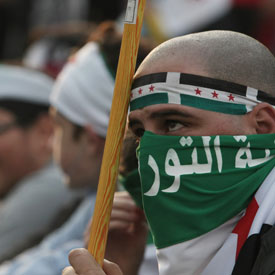Return to the birthplace of Syria’s uprising
As Syria faces sanctions from its Arab neighbours, Jonathan Miller returns to the city of Dara’a where the uprisings first began in March.
Three children are among at least 20 people who have been killed by security forces across Syria – according to the opposition. The regime is now making intense diplomatic efforts to avert sanctions by the Arab League.
Our Foreign Affairs Correspondent, Jonathan Miller, has been in Syria this past week, operating under tight government restrictions. Despite this – he wanted to see where the revolt started the southern city of Dara’a, where 500 people are reported to have been killed so far

Sanctions for Syria?
A Friday deadline to sign an agreement which allowed Arab League observers to enter Syria was missed by President Bashar al-Assad’s government.
Syria pledged earlier this month to remove military forces from built up areas and allow in the observers, but the violence has continued.
The United Nations has estimated over 3,500 people have died in the uprising that began in March, that seeks the removal of President Assad from power.
The Syrian government has blamed other countries in the region for inciting the violence, and says armed groups are targeting civilians and security forces.
Arab ministers had warned that unless Syria agreed to let monitors in, they could consider imposing sanctions including suspending flights to Syria, stopping dealings with the central bank, freezing Syrian government bank accounts and halting financial dealings.
They could also decide to stop commercial trade with the Syrian government “with the exception of strategic commodities so as not to impact the Syrian people”, the ministers said.
Syria’s economy is already struggling from months of unrest, aggravated by U.S. and European sanctions on oil exports and several state businesses.
The Turkish foreign minister, Ahmet Davutoglu said his country could take steps alongside the Arab League if Syria did not respond to the proposal for observers positively.
“I want to say clearly we have no more tolerance for the bloodshed in Syria,” he said.
Meanwhile France has proposed “humanitarian corridors” be set up through which food and medicine could be shipped to ease civilian suffering.
The French plan could link Syrian cities to the frontiers of Turkey and Lebanon, to the Mediterranean coast or to an airport, and enable supply of humanitarian supplies or medicines to people in need.
French Foreign Minister Alain Juppe said the plan fell short of a military intervention but acknowledged that humanitarian convoys might need armed protection.
If the Syrian government didn’t agree to the proposals, than the French plans could only work if they were backed by force.
The United Nations however said the situation the country is not so bad yet as it to justify these corridors.
“A number of suggestions have been made on how to provide assistance to Syrians affected by the current unrest,” said the United Nations humanitarian co-ordinator Valerie Amos.
“At present, the humanitarian needs identified in Syria do not warrant the implementation of either of those mechanisms,” she said, adding that the United Nations had been unable to assess comprehensively those needs because of the limited number of international staff operating in Syria.
“Before any further discussion of these options, it is essential to get a clearer sense of what exactly people need, and where,” Amos said on Friday.
Meanwhile Russia, China, Brazil, India and South Africa have voiced opposition to sanctions and warned against a foreign military intervention.
“At the current stage, what is needed is not resolutions, not sanctions, not pressure, but internal Syrian dialogue,” Russian Foreign Ministry spokesman Alexander Lukashevich said.
Lukashevich said Russia supported the Arab League’s call for a halt to the violence but that “radical opposition” groups with foreign support shared the blame. Outside military intervention was “absolutely unacceptable”, he said.
